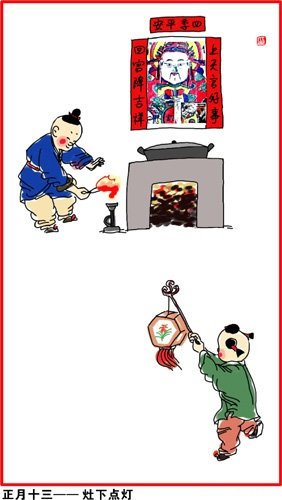inese New Year is a traditional festival with a long history. It’s the most important holiday for Chinese people, and thus much attention has been paid to it since ancient times. Its preparation starts seven days before New Year’s Eve, from the twenty-third day of the twelfth lunar month.
The following shows the interesting activities that happens on each day, and customs during the festival. The dates are listed according to the lunar calendar.
This is how the Chinese end the old year and celebrate the New Year.
December 23rd
It’s the day to send the Kitchen God back to Heaven to report for duty.
December 24th
House cleaning starts.
December 25th
The Jade Emperor comes down to human world and visit households.
December 26th
Prepare meat for New Year holidays.
December 27th
Cook chicken for New Year. It’s the day to make chicken dishes and go shopping for goods to prepare for New Year.
December 28th
Make assorted cakes, steam dumplings and spring couplets, Fu Character, and paper cuts to decorate the home and keep away evil spirits.
December 29th
Sweep ancestral shrine.
New Year Eve
The young and old stay up late to welcome in the New Year.
New Year’s Day
The first thing to do on the morning of New Year’s Day is to set off firecrackers to drive away evil spirits. Afterward, the Chinese will have the first meal of the year, which is as important as the reunion dinner for most Chinese people.
Most people choose to eat dumplings, hoping to have good fortune in the New Year, because dumpling’s shape is similar to gold ingots, which was the currency used in ancient times. People in South China prefer to eat rice cakes, because rice cakes are a symbol of wealth.
Young people will visit elders, and in return, elders will give them red envelopes with money inside for good luck.
January 2nd
It’s the time for married women to visit their birth parents. In ancient times in China, women usually didn’t visit their birth parents’ places much once they got married. Though nowadays women can do that at any time, this custom, to visit birth parents on Jan 2nd, remains.
January 3rd
This day is also called Goat Day, on which people cannot kill sheep or goats. In southern China, people think quarrels can easily happen on this day, so they don’t visit each other.
January 4th
It’s the day to welcome the Kitchen God back.
January 5th
People welcome the God of Wealth from all directions and routes. It’s a custom to eat dumplings on this day and set off firecrackers.
January 6th
People drink and get soaked in holiday spirit.
January 7th
Happy birthday to all people! It’s said that Chinese people were made on this day, so everyone celebrates this day as their birthday.
January 8th
People free birds and fishes to bring blessings.
January 9th
It’s the birthday of the Jade Emperor. People have gatherings and play operas to celebrate in his honor.
January 10th
It’s the day of Earth, symbolized with rocks. Any handling of rock-products is forbidden for the day.
January 11th
It’s Son-in-laws’ Day. Father-in-laws treat son-in-laws with leftovers from Jan 9th.
January 12th
People begin to set up stalls and awnings in preparation for the Lantern Festival.
January 13th
People in ancient times lit fires underneath stoves to get ready for the Lantern Festival.
January 14th
It’s the birthday of the Goddess of Birth.
January 15th
People celebrate the Lantern Festival today! New Year holidays now officially end.

























0 评论:
Post a Comment